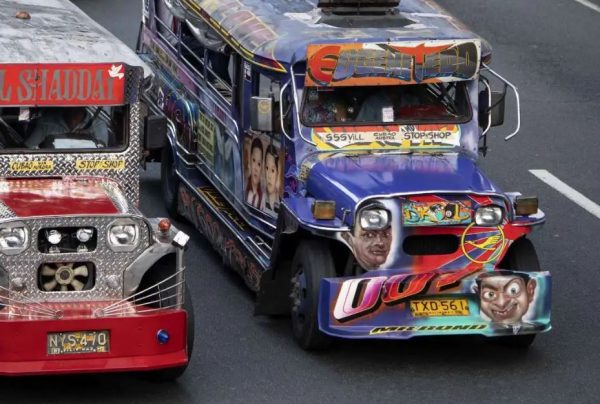Battle rages to save iconic World War II legacy in Philippines
January 2, 2024 · By Ronald O. Reyes for www.ucanews.com

Jeepneys are adorned with images of everything from Batman to babies, as well as disco lights and chrome wheels. (Photo: AFP)
Battle rages to save iconic World War II legacy in Philippines
Getting rid of Jeepneys, the iconic public transport vehicle in the Philippines, seems to have become the target of government efforts to provide world-class transport.
Several transport groups in the archipelago have launched nationwide strikes to oppose the phasing out of colorful Jeepneys as President Ferdinand Marcos Jr. is firm on a Dec. 31 deadline to start doing so.
On Dec. 14, the drivers organized a protest at the office of the state-run Land Transportation Franchising and Regulatory Board, tasked with improving land transportation and the franchise system in the country of 111.6 million people.
The drivers vowed to stay there “until their demands are met.”
Jeepneys are extensively used in the public transport system in the Philippines. They are re-purposed from army Jeeps left after World War II with chassis often as old as 50 to 70 years old, capable of accommodating up to 32 passengers.
When US troops went home in 1946, they left behind hundreds of Jeeps and enterprising Filipinos fitted them with benches and daubed them with colorful illustrations and hand-made paintings to offer a ride to commuters.
Though the originals have mostly been scrapped, their jerry-rigged replicas still ply the roads and are used by people without cars. They outnumber buses roughly ten to one.
Jeepneys are to Filipinos what double-deckers are to Londoners.
‘Anti-poor modernization’
In 2017, the government launched a program to modernize and make the public transportation system environmentally friendly by 2020. It calls for the phasing out of Jeepneys, buses and other public utility vehicles.
Since its inception, the Catholic Bishops’ Conference of the Philippines has been urging the government to ensure proper “safety nets” for drivers and owners before phasing out Jeepneys.
The modernization program faced delays due to multiple strikes and opposition from transport groups.
Under the program, a modern Jeepney should adhere to the Euro-4 emission standard and should use advanced technological tools like GPS and Wi-Fi, rendering the current Jeepney obsolete.
Modern Jeepneys cost up to P2.4 million (US$43,000). Unlike the clunky and noisy Jeepneys, these are equipped with safety and convenient features.
But the cost is beyond the reach of many Jeepney drivers.
“Where can we find that amount of money?” Jepoy Castro, a driver for 13 years in Tacloban City in the central Philippines, asked while echoing the general mood.
To rehabilitate the drivers, the government launched skills training programs and offered subsidies to buy new vehicles through an “affordable loan” program.
The government also wanted Jeepney drivers and small-time operators of utility units to form cooperative societies before Dec. 31 under a consolidation initiative.
‘Where is the government?’
The minimum number of persons to start a cooperative society, which is aimed at giving social security, a fixed salary, and access to credit facilities, is 15.
Caritas Philippines, the social service arm of the Church, has assisted drivers and operators in forming a few cooperatives.
The new program will axe the “boundary system,” wherein small-time drivers pay the Jeepney owner a fixed amount, known as “boundary” as a form of rent.
On Dec. 12, Marcos said the government “cannot allow further delays in its implementation” because it affects “operators, banks, financial institutions and the public.”
Mody Floranda, president of transport group Piston, said Marcos Jr. “is causing an unprecedented transport crisis” by not extending the deadline for forming cooperatives and phasing out of aged Jeepneys.
The phasing out threatens the jobs of some 69,000 drivers and 29,000 operators, Floranda said in a statement.
The modernization program “is flawed, anti-poor, and serves the interests of big businesses,” he said.
Senator Grace Poe, chairperson of the Committee on Public Services, criticized the government for not providing aid to affected Jeepney drivers.
The senator slammed the transport department “for missing its targets while setting a strict deadline for drivers and operators.”
“Where is the government in this modernization?” Poe asked.






